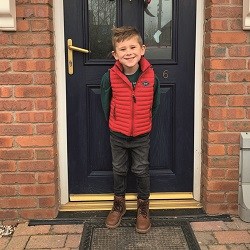How do I...keep my child safe online?
With so much of our lives being lived online at the moment, it’s especially important to make sure children and young people know how to use the internet safely. Three families told us how they keep everyone safe online.

Jazzy (21) is profoundly deaf and wears cochlear implants.
I started my YouTube channel when I was 16. Luckily, my parents were really supportive. They didn’t really understand what YouTube was until I got invited to do a workshop for deaf people and started working with different brands. They realised how important YouTube is for developing my deaf identity and raising deaf awareness.
I’ve had some experiences online which made me feel unsafe, like receiving threatening comments on my videos. The internet isn’t perfect; there are some people who sit behind the computer typing horrible things about other people because they have nothing better to do. I just ignore and block those users as they’re not worth it!
My advice is to enjoy using the internet but don’t share any personal information online. Don’t respond to hate messages or online bullying as it could make things worse. Simply block and report the accounts. And don’t ever believe the bully! Websites such as YouTube can be a great way to tell stories about your deaf life, share experiences and inspire others. Just make sure your channel is a safe place.

Melanie is mum to Jazzy (21) who is profoundly deaf and wears cochlear implants.
Jazzy started using the internet when she was 11. I made sure that the sites she used were age-appropriate. At the time, Jazzy asked me to check her English when she wrote most things so I could see what was going on.
It became harder to monitor Jazzy’s internet use when she got her first mobile phone. Sometimes she’d get upset over arguments with people online, so I’d remove her phone or get her to block them.
When Jazzy started her YouTube channel, I didn’t have any concerns as I always helped her edit subtitles so could see what was going on. However, after she’d been using her channel for a year or so, she got some extremely nasty comments. They were particularly worrying as they all came from the same user. We blocked the person and filed a complaint with YouTube. When you put yourself out there online, you have to be aware there can be some unpleasant people and comments.
Despite this, if your child wants to set up a YouTube channel, I would encourage you to let them. It gives them a voice that they might feel they don’t otherwise have. Having a creative platform enables them to grow and become more confident. They might also develop new skills like filming, editing and subtitling. All in all, I believe it’s a great thing for a young person to do.

Emma is mum to Bethany (12), Ben (9) and Bobby (1). Bobby is mildly to moderately deaf and wears hearing aids.
Since the first lockdown in March, we’ve been using the internet a lot more. We’ve had medical appointments over Zoom and been learning sign language on YouTube. I’ve also participated in online sessions with the National Deaf Children’s Society, which have been brilliant. Bethany and Ben have their school work set online now, play games and use the internet to find music videos for Bobby to watch.
Bobby is only a baby so he doesn’t use the internet by himself, but we’ve learned lots of things to prepare us to keep Bobby safe when he’s older. Our iPad is used by the whole family and is locked by parental controls, so if Bethany and Ben give Bobby a video to watch, we know it will be appropriate. My husband monitors their online activity using Microsoft parental controls, and has weekly usage reports sent to our email accounts. If the kids try to access blocked pages, the parental control alerts our phones. The WiFi also switches off each night between 7.30pm and 8am, which allows us to limit how much time they spend online.
We had an internet safety talk from our local police at our children’s school. Off the back of that we made a family contract regarding internet use, and have a family rule that if the contract is broken, the WiFi will be switched off for a week. So far, it’s a good deterrent!

Marsha is mum to Logan (4) who is severely to profoundly deaf and wears hearing aids.
Logan has his own iPad which is connected to a Roger pen, which automatically connects to his hearing aids. My husband, who’s also deaf, helped set everything up. We only let Logan use child-safe apps and games, such as YouTube Kids, Netflix Kids and learning games like Hairy Letters. We have a password to download new apps, so if he wants a new game he has to ask Mummy or Daddy first.
As Logan’s still young, we sit with him while he’s using the iPad, so we know which sites he’s visiting and can keep an eye on the Roger pen, too. The internet is a huge part of Logan’s learning now, so I’m glad we’ve had the practice during the pandemic to learn how to keep him safe.
